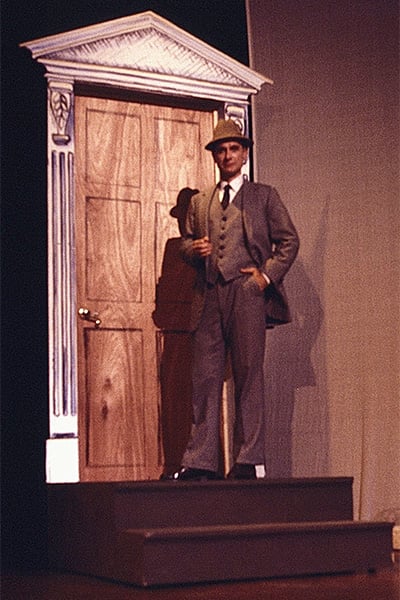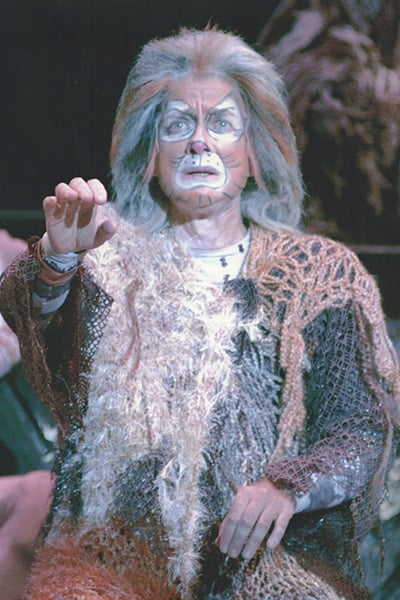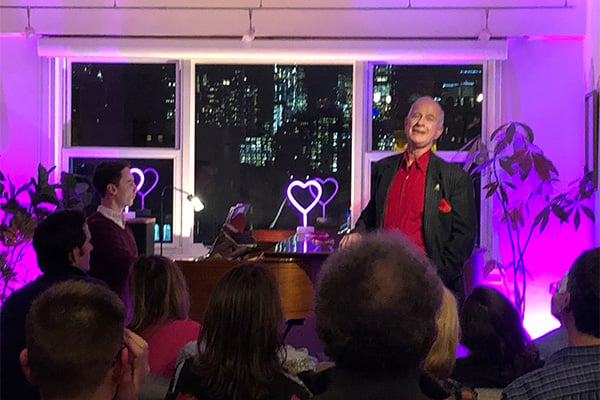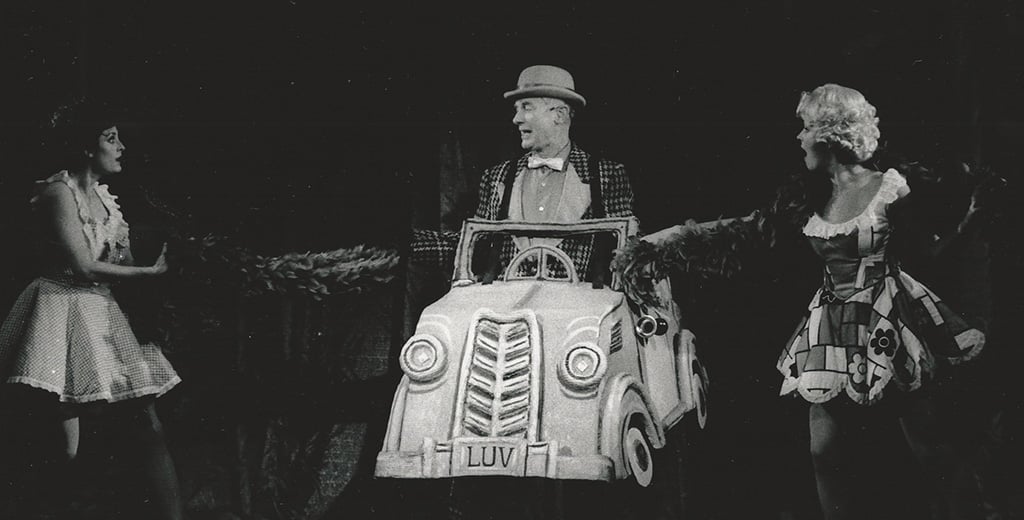From University Theatre to Broadway and the global stage

Kelly in a production of Accustomed / John-Charles Kelly
John-Charles Kelly, BA ’68 (speech), loved the 1961 film West Side Story, so when the University of Oregon became one of the first universities west of the Mississippi to produce the show in 1965, Kelly was thrilled to audition. Little did he know that this experience in the theater would shape the course of his career.
“Just being a part of West Side Story at the University Theatre, that was the beginning of everything for me,” he said.
Kelly grew up about 80 miles north of Eugene in Mill City, Oregon, a small town with a population of less than 1,500 at the time. He graduated from Santiam High School in a class of 35 people and moved to Eugene to start college.
During his time at Oregon, Kelly got involved in the UO theater department, performing in various shows, including West Side Story, in which he played Tiger. He also performed in The Royal Hunt of the Sun and Guys and Dolls. When he wasn’t in rehearsal, he spent time studying at the library, hanging out with friends at the EMU, and with his fraternity, Kappa Sigma.
After graduating from the UO, Kelly moved to Los Angeles, where he would meet with his friend, choreographer and director Fred Walton. The two took dance classes from world-renowned Joe Tremaine and dreamt of moving to New York City. Finally, Walton found an apartment on 80th street, Kelly found $69 tickets on World Airlines (a long-gone cargo line), and they made the cross-country move to NYC.
There, Kelly worked on the soap opera, Guiding Light. After being on the show a few times, he attended open call auditions at Actor’s Equity and was booked for two musicals in a row: Anyone Can Whistle at Berkshire Theatre Festival and Zapata at Goodspeed Opera House. Kelly remembers driving back and forth between Berkshire, Massachusetts and Goodspeed, Connecticut to make rehearsals and call times for both shows. After Zapata closed, Kelly booked the first national tour of Annie and the national tour of They’re Playing Our Song. He’d go on to be involved in many additional shows both on and off Broadway, including A Christmas Carol at Madison Square Garden’s Paramount Theatre.
“A memory that really stands out is the curtain call every night at Christmas Carol with thousands of people applauding as the snow fell down, singing the songs that we could barely get through because we were so excited,” Kelly said. “To be there—that’s a special memory.”

Kelly as Gus in Cats / John-Charles Kelly
Kelly’s theater career has taken him around the world. While on the European tour of West Side Story, a mutual friend invited him to audition for a production of Cats in Vienna, Austria. Despite not speaking the language for the all-German production, or having extensive dance experience , he booked the roles of Gus and Bustopher. Kelly, who replaced a notable actor in German theater, had three months to learn the intense jazz, contemporary, and ballet choreography and the German script for the show.
Kelly recalled the times he spotted the show’s crew at the canteen’s bar during intermission, which resulted in a few close calls with scenery and cues in the second act.
“It was an experience. There were 250 people working at this theater backstage and in the office, and it was controlled by the state,” Kelly said. “We had to adapt to a whole different system of theater, but the experience was wonderful, and I’m still friends with some of my Cats castmates.”
In addition to performing all around Europe, Kelly has been involved with numerous regional theater productions and national tours.
His experience in the 2006–07 Light in the Piazza national tour stands out, as Kelly was cast as a swing, a company member that understudies several ensemble tracks. It’s a high-pressure role; swings can be on call at a moment’s notice— even in the middle of the show. In Light in the Piazza, Kelly covered 20, 30, 40, and 50-year-old characters, and he was 60 at the time.
“I was talking to somebody who’s a swing on Broadway now, and they love it,” Kelly said. “They said it’s great to come to the theater and not know what you’re going to do until you get there . . . not to me.”

Kelly at Stonewall Chorale's 2019 Valentine's cabaret / John-Charles Kelly
On March 12, 2020, Broadway went dark for its longest closure ever. The shutdown emphasized the importance of live theater for artists and patrons alike. The theater community rallied together in many ways, finding new avenues for their craft during the pandemic. Kelly continued his work with his church choir and The Stonewall Chorale.
The Stonewall Chorale, the first LGBTQIA+ chorus in the US, is a four-part, mixed chorus based in New York City and made up of about 60 members. Kelly says that being in community with other artists and singers is what keeps him going.
“With the chorale, we get to do a lot of different things that I never would have had a chance to do,” he said. “For instance, we’re doing Considering Matthew Shepard in March—a 33-part oratorio to commemorate the 25th anniversary of Matthew Shepard’s death.”
Reflecting on his inspirations, Kelly says that his greatest role models have been the four best directors he’s worked with: Peter Marroney and Irene Comer at the University of Arizona; Gillian Lynne, who directed and choreographed Cats in Austria; and Charles Abbott, Kelly’s husband, with whom he’s done many shows, including five productions of his favorite musical, Follies.

Kelly in a production of his favorite musical, Follies / John-Charles Kelly
Throughout his career, the works of Stephen Sondheim—from West Side Story to Follies—seem to resonate with Kelly.
“My partner was able to meet Sondheim three or four times, and I met him two or three times,” Kelly said. “It was always a thrill. He was an absolute genius.”
Nowadays, Kelly stays busy with his choir commitments, as well as attending the occasional Broadway show with his husband.
“The pickings have been sort of sparse,” Kelly said. “But we had a good time at Some Like It Hot, and we really want to see MJ and & Juliet. We’re looking forward to the Parade revival, of course. I saw the original 1998 production, and then I saw a production in Boston that I really liked, so I’m excited to see the revival.”
–By Peyton Hall, UO Alumni Association Student Associate

